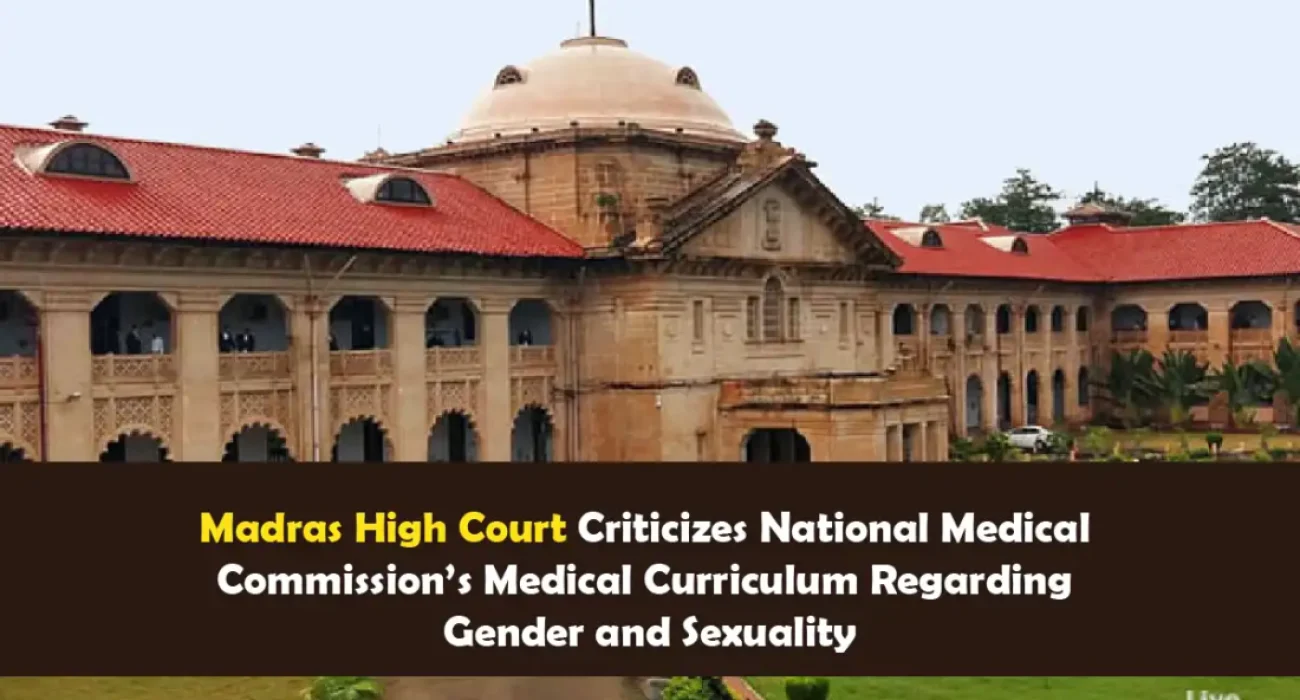

Table of Contents
ToggleThe case before the Madras High Court revolved around the National Medical Commission’s (NMC) proposed medical curriculum, particularly its handling of issues related to gender identity, sexuality, and the LGBTQIA+ community. The NMC had introduced changes to the curriculum that were brought to the court’s attention in February 2025. The petitioner raised objections to the NMC’s stance, particularly concerning the use of the term “Gender Identity Disorder” in the curriculum, which was perceived to be outdated and harmful to the progress made regarding LGBTQIA+ rights. The petitioner argued that the NMC’s curriculum had ignored progressive recommendations made in 2022 by a committee appointed by the NMC itself.
The case also dealt with the question of conversion therapy, with the NMC indicating that the inclusion of conversion therapy as professional misconduct had been postponed. Additionally, the state presented its policy on transgender persons, and the court was tasked with considering the adequacy of this policy in ensuring the rights of the LGBTQIA+ community.
The petitioner, represented by counsel, raised significant objections to the National Medical Commission’s revised curriculum. The petitioner contended that the NMC had reverted to its original stance, disregarding positive changes recommended by a committee in 2022. Of particular concern was the continued use of the term “Gender Identity Disorder,” which the petitioner argued reinforced negative stereotypes and misrepresented the lived experiences of LGBTQIA+ persons. The petitioner asserted that this outdated terminology would hinder the progress already made by the judiciary in promoting rights and acceptance for the LGBTQIA+ community.
The petitioner also objected to the NMC’s view that homosexuality and related topics should be excluded from the medical curriculum, citing the argument that since these topics were taught in schools, they did not warrant inclusion in medical education. The petitioner criticized this perspective, emphasizing that educational institutions like schools were not equipped with the scientific rigor and understanding necessary to address such important issues accurately. The petitioner stressed that the medical curriculum should be inclusive and forward-thinking, not neglecting the realities of gender and sexual diversity.
The National Medical Commission, through its counsel, responded by explaining that the changes introduced in the curriculum were an effort to address evolving knowledge in the medical field. However, the NMC maintained that it had kept the 2004 regulations in force concerning conversion therapy, as the 2023 regulations, which would have included conversion therapy as professional misconduct, were currently in abeyance. The NMC thus indicated that no immediate change could be made to the existing regulations until the new ones were finalized.
Regarding the curriculum, the NMC stood by its decision to exclude certain topics, such as homosexuality, from medical education, citing the argument that such issues were already covered in schools. The NMC expressed hesitation about revising the language on gender identity in the medical curriculum, thus drawing criticism from the petitioner and the court alike.
The state also presented its position concerning the Transgender Persons (Protection of Rights) Rules, which were at a crucial stage of finalization. The state informed the court that inputs from various departments had been sought, and the policy would soon be placed before the council of ministers for approval. Additionally, the state explained its decision to create separate policies for transgender and intersex persons, citing their unique experiences of discrimination, while also developing policies for the broader LGBTQIA+ community.
Justice Anand Venkatesh, who has consistently advocated for the rights of the LGBTQIA+ community, expressed strong dissatisfaction with the NMC’s stance. He criticized the continued use of the term “Gender Identity Disorder,” emphasizing that such terminology would perpetuate harmful views and negate the progress made in changing societal attitudes toward gender diversity. The court highlighted that individuals within the LGBTQIA+ community should not be categorized as having a disorder, as they were naturally created in their diverse gender expressions.
The court also remarked that the NMC’s decision to exclude topics like homosexuality from the medical curriculum was misguided. Justice Venkatesh questioned the logic behind expecting schools, which often lacked a scientific approach to such topics, to teach issues like homosexuality, while the NMC, a body responsible for medical education, hesitated to address these issues. The court’s frustration was evident as it emphasized that such hesitations only served to undermine the broader efforts toward societal acceptance of the LGBTQIA+ community.
Regarding the state’s policy, the court expressed concerns about the separation of policies for transgender persons and the broader LGBTQIA+ community. Justice Venkatesh suggested that creating separate policies could lead to further confusion and reinforce the notion that transgender and intersex individuals were distinct from the rest of the LGBTQIA+ community. The court advocated for a consolidated policy that could encompass the needs of all LGBTQIA+ persons, with specific provisions for the transgender community.
After hearing the arguments, the court issued the following directions and observations:
The case was adjourned to February 17, 2025, for further discussion and the presentation of the policies.
Credits: Deeksha Rai
IAW resources
Browse our help directory